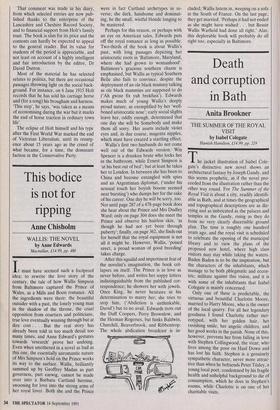This bodice is not for ripping
Anne Chisholm
WALLIS: THE NOVEL by Anne Edwards
Macmillan, £14.99, pp. 480
It must have seemed such a foolproof idea; to rewrite the love story of the century, the tale of how Wallis Simpson from Baltimore captured the Prince of Wales, as a Mills and Boon romance. All the ingredients were there: the beautiful outsider with a past, the lonely young man in the shadow of the throne, the cruel opposition from courtiers and politicians, true love eventually winning through but at dire cost . . . . But the real story has already been told in too much detail too many times, and Anne Edward's gestures towards 'research' prove her undoing. Even when smothered in a novel as bad as this one, the essentially unromantic nature of Mrs Simpson's hold on the Prince works its way to the surface. Wallis, brilliantly summed up by Geoffrey Madan as part governess, part earwig, cannot be made over into a Barbara Cartland heroine, swooning for love into the strong arms of her royal lover. Both she and the Prince were in fact Cartland archetypes in re- verse; she dark, handsome and dominat- ing, he the small, wistful blonde longing to be mastered.
Perhaps for this reason, or perhaps with an eye on American sales, Edwards puts off the royal romance as long as possible. Two-thirds of the book is about Wallis's past, with long passages depicting her aristocratic roots in 'Baltimore, Maryland, where she had grown to womanhood'. Baltimore's gracious southern charm is emphasised, but Wallis as typical Southern Belle also fails to convince, despite the deployment of an ole black mammy talking as ole black mammies are supposed to do (`Ah gwine fix yuh brekfuss'). Edwards makes much of young Wallis's deeply proud nature, as exemplified by her 'well- boned aristocratic nose'; early social slights leave her, oddly enough, determined that one day she will be Somebody and make them all sorry. Her assets include violet eyes and, in due course, magenta nipples, which must have created a startling effect.
Wallis's first two husbands do not come well out of the Edwards version. Win Spencer is a drunken brute who locks her in the bathroom, while Ernest Simpson is `at his best out of bed'; but at least he takes her to London. In between she has been to China and become entangled with spies and an Argentinian diplomat, (`under his sensual touch her boyish bosom seemed near bursting') who dumps her for the sake of his career. One day he will be sorry, too. Not until page 287 of a 478-page book does she hear about the Prince and Mrs Dudley Ward; only on page 304 does she meet the Prince and observe his hairless skin, 'as though he had not yet been through puberty'; finally, on page 362, she finds out for herself that the royal equipment is not all it might be. However, Wallis, 'poised erect, a proud woman of good breeding' takes charge.
After this squalid and impertinent feat of the novelist's imagination, the book col- lapses on itself. The Prince is in love as never before, and writes her soppy letters indistinguishable from the published cor- respondence; he showers her with jewels. Once King, he never hesitates in his determination to marry her; she tries to stop him, (`Abdiction is unthinkable, David') but to no avail. Edwards trots out the Duff Coopers, Perry Brownlow, and the Herman Rogerses, but funks Baldwin, Churchill, Beaverbrook, and Ribbentrop. The whole abdication broadcast is in- cluded; Wallis listens in, weeping on a sofa in the South of France. On the last page, they get married. 'Perhaps it had not ended as she might have wished . . . but Bessie Wallis Warfield had done all right.' Alas, this deplorable book will probably do all right too, especially in Baltimore.


















































 Previous page
Previous page